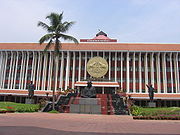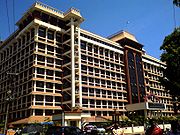Kerala is governed via a parliamentary system of representative democracy; universal suffrage is granted to state residents. There are three branches of government.  The unicameral legislature, the Kerala Legislative Assembly, comprises elected members and special office bearers (the Speaker and Deputy Speaker) elected by the members from among themselves. Assembly meetings are presided over by the Speaker and in his absence by the Deputy Speaker. Kerala has 140 Assembly constituencies. The state sends 20 members to the Lok Sabha and 9 to the Rajya Sabha, the Indian Parliament's upper house. The unicameral legislature, the Kerala Legislative Assembly, comprises elected members and special office bearers (the Speaker and Deputy Speaker) elected by the members from among themselves. Assembly meetings are presided over by the Speaker and in his absence by the Deputy Speaker. Kerala has 140 Assembly constituencies. The state sends 20 members to the Lok Sabha and 9 to the Rajya Sabha, the Indian Parliament's upper house.
The Governor of Kerala is the constitutional head of state, and is appointed by the President of India. The executive authority is headed by the Chief Minister of Kerala, who is the de facto head of state and is vested with extensive executive powers; the Legislative Assembly's majority party leader is appointed to this position by the Governor. The Council of Ministers, which answers to the Legislative Assembly, has its members appointed by the Governor on advice of the Chief Minister.  The Kerala High Court in Ernakulam.The judiciary comprises the Kerala High Court (including a Chief Justice combined with 26 permanent and two additional (pro tempore) justices) and a system of lower courts. The High Court of Kerala is the apex court for the state; it also hears cases from the Union Territory of Lakshadweep. Auxiliary authorities known as panchayats, for which local body elections are regularly held, govern local affairs. The state's 2005–2006 budget was 219 billion INR. The state government's tax revenues (excluding the shares from Union tax pool) amounted to 111,248 million INR in 2005, up from 63,599 million in 2000. Its non-tax revenues (excluding the shares from Union tax pool) of the Government of Kerala as assessed by the Indian Finance Commissions reached 10,809 million INR in 2005, nearly double the 6,847 million INR revenues of 2000. However, Kerala's high ratio of taxation to gross state domestic product (GSDP) has not alleviated chronic budget deficits and unsustainable levels of government debt, impacting social services. The Kerala High Court in Ernakulam.The judiciary comprises the Kerala High Court (including a Chief Justice combined with 26 permanent and two additional (pro tempore) justices) and a system of lower courts. The High Court of Kerala is the apex court for the state; it also hears cases from the Union Territory of Lakshadweep. Auxiliary authorities known as panchayats, for which local body elections are regularly held, govern local affairs. The state's 2005–2006 budget was 219 billion INR. The state government's tax revenues (excluding the shares from Union tax pool) amounted to 111,248 million INR in 2005, up from 63,599 million in 2000. Its non-tax revenues (excluding the shares from Union tax pool) of the Government of Kerala as assessed by the Indian Finance Commissions reached 10,809 million INR in 2005, nearly double the 6,847 million INR revenues of 2000. However, Kerala's high ratio of taxation to gross state domestic product (GSDP) has not alleviated chronic budget deficits and unsustainable levels of government debt, impacting social services.
|
 The unicameral legislature, the Kerala Legislative Assembly, comprises elected members and special office bearers (the Speaker and Deputy Speaker) elected by the members from among themselves. Assembly meetings are presided over by the Speaker and in his absence by the Deputy Speaker. Kerala has 140 Assembly constituencies. The state sends 20 members to the Lok Sabha and 9 to the Rajya Sabha, the Indian Parliament's upper house.
The unicameral legislature, the Kerala Legislative Assembly, comprises elected members and special office bearers (the Speaker and Deputy Speaker) elected by the members from among themselves. Assembly meetings are presided over by the Speaker and in his absence by the Deputy Speaker. Kerala has 140 Assembly constituencies. The state sends 20 members to the Lok Sabha and 9 to the Rajya Sabha, the Indian Parliament's upper house. The Kerala High Court in Ernakulam.The judiciary comprises the Kerala High Court (including a Chief Justice combined with 26 permanent and two additional (pro tempore) justices) and a system of lower courts. The High Court of Kerala is the apex court for the state; it also hears cases from the Union Territory of Lakshadweep. Auxiliary authorities known as panchayats, for which local body elections are regularly held, govern local affairs. The state's 2005–2006 budget was 219 billion INR. The state government's tax revenues (excluding the shares from Union tax pool) amounted to 111,248 million INR in 2005, up from 63,599 million in 2000. Its non-tax revenues (excluding the shares from Union tax pool) of the Government of Kerala as assessed by the Indian Finance Commissions reached 10,809 million INR in 2005, nearly double the 6,847 million INR revenues of 2000. However, Kerala's high ratio of taxation to gross state domestic product (GSDP) has not alleviated chronic budget deficits and unsustainable levels of government debt, impacting social services.
The Kerala High Court in Ernakulam.The judiciary comprises the Kerala High Court (including a Chief Justice combined with 26 permanent and two additional (pro tempore) justices) and a system of lower courts. The High Court of Kerala is the apex court for the state; it also hears cases from the Union Territory of Lakshadweep. Auxiliary authorities known as panchayats, for which local body elections are regularly held, govern local affairs. The state's 2005–2006 budget was 219 billion INR. The state government's tax revenues (excluding the shares from Union tax pool) amounted to 111,248 million INR in 2005, up from 63,599 million in 2000. Its non-tax revenues (excluding the shares from Union tax pool) of the Government of Kerala as assessed by the Indian Finance Commissions reached 10,809 million INR in 2005, nearly double the 6,847 million INR revenues of 2000. However, Kerala's high ratio of taxation to gross state domestic product (GSDP) has not alleviated chronic budget deficits and unsustainable levels of government debt, impacting social services.

